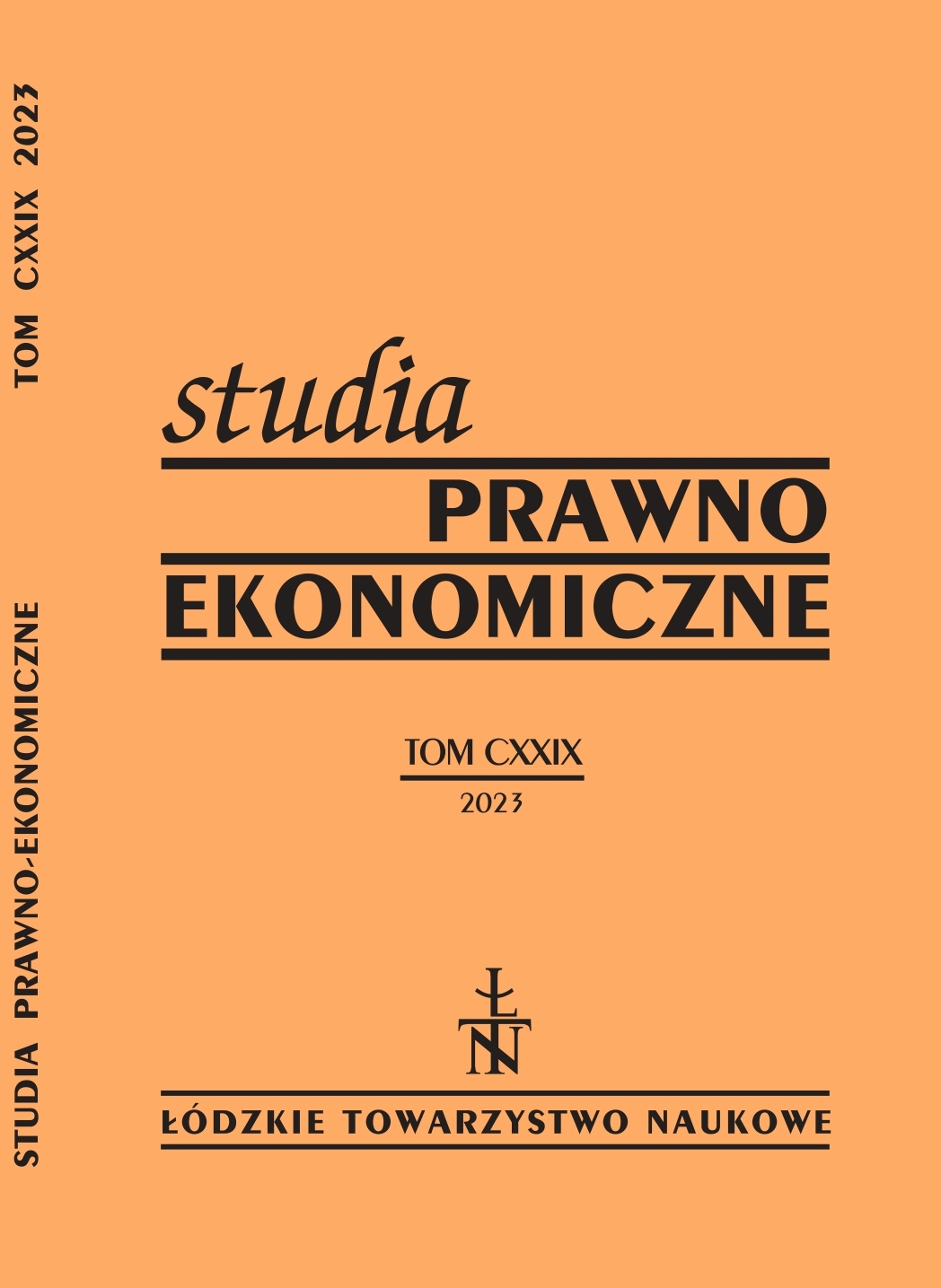Acquisition of possession by occupatio of natural benefits of land and animal products according to Leon Piniński’s theory. Part 3
DOI:
https://doi.org/10.26485/SPE/2023/129/2Keywords:
Leon Piniński, Roman law studies in Poland, Pandectists, acquisition of possession, occupation.Abstract
Background: The aim of article is explore the acquisition of possession of the natural benefits of the land (Besitzerwerb an Feldfrüchten) and animal products (Besitzerwerb an Thierprodukten) according to the Leon Piniński’s possessio theory. This is the latest in a series of articles devoted to the considerations of the Polish Romanist on the acquisition of possession of movable things by occupatio.
Research purpose: One research purpose is to understand the concept of possessio developed by Piniński in terms of the economic connection between man and a thing. The other research purpose is to characterize the scientific profile of the Polish Romanist against the background of the activity of the Pandectists and other representatives of German-speaking legal scholarship.
Methods: The article uses the historical and legal method.
Conclusions: The conclusions of the two preceding articles remain valid. They may be supplemented by a general proposal. Pininski’s scholarly activity against the backdrop of 19 th century German-speaking legal science, which was dominated by Pandectists, deserves the attention not only of Roman law studies, but also of the dogmatists of the law in force. The author, whose work is appreciated and quoted in European literature, remains almost unnoticed in Polish doctrine. But any alternative theory on which the system of the law in force is based – in this case the possessio theory – is still a source of scientific inspiration, not just for the legal historian.
Downloads
References
Arndts K.L., Lehrbuch der Pandekten 11 , Stuttgart 1883.
Benincasa Z., ‘Accessio ab alluvione’ i ‘reditus venationis et aucupii’ jako ‘fructus fundi’. Kilka uwag na marginesie PS. 3,6,22, Zeszyty Prawnicze 2015/15.2, s. 135–159.
Benincasa Z., Od ‘res nullius’ do ‘fructus fundi’. Upolowana zwierzyna oraz zyski z polowania i połowu jako pożytek z gruntu w rozważaniach rzymskich jurystów, Zeszyty Prawnicze 2020/20.4, s. 23–51.
Bojarski W., Pożytki naturalne w prawie rzymskim: studium z rzymskiego prawa majątkowego, Toruń 1979.
Bojarski W., Problem definicji pożytków naturalnych w prawie rzymskim, Acta Universitatis Nicolai Copernici. Nauki Humanistyczno-Społeczne. Prawo 1976/12, s. 11–24.
Brinz A., Lehrbuch der Pandekten 2 , Bd. 1, Erlangen 1873, s. 546–554.
Chlamtacz M., O nabyciu owoców przez posiadacza w dobrej wierze w klasycznem prawie rzymskiem z uwzględnieniem prawa cywilnego austryackiego i niemieckiego, Lwów 1903.
Eisenhart A. v, Wächter, Carl Georg von, Allgemeine Deutsche Biographie 1896/40, s. 435–440, https://www.deutsche-biographie.de/pnd172455790.html#adbcontent; stan na 15.10.2023 r.
Göppert H.R., Organische Erzeugnisse. Eine Untersuchung aus dem römischen Sachenrecht, Halle 1869.
Heimbach G.E., Die Lehre von der Frucht nach den gemeinen, in Deutschland geltenden Rechten, Leipzig 1843.
Lenel O., Palingenesia iuris civilis, vol. 1, Lipsiae 1889.
Pikulska-Radomska A., Skrzywanek-Jaworska D., Leona hr. Pinińskiego Wprowadzenie do teorii posiadania, w: A. Lityński, A. Matan, M. Mikołajczyk, D. Nawrot, G. Nancka (red.), Verus amicus rara avis est. Studia poświęcone pamięci Wojciecha Organiściaka, Katowice 2020, s. 664–676.
Piniński L., Der Thatbestand des Sachbesitzerwerbs nach gemeinem Recht. Eine zivilistische Untersuchung, Bd. 1, Leipzig 1885.
Piniński L., Der Thatbestand des Sachbesitzerwerbs nach gemeinem Recht. Eine zivilistische Untersuchung, Bd. 2: Sukzession in den Besitz, Besitzerwerb animo solo, Besitzwille, Lehre von den juristischen Willenserklärungen, Leipzig 1888.
Rudnicki J., Gdzie szukać rzeczy niczyich, czyli do czego służy kodeks cywilny, Forum Prawnicze 2014/5, s. 16–27.
Sadowski P., Pożytki naturalne i nabycie ich własności w prawie rzymskim, w: E. Kozera, P. Sadowski (red.), Problemy własności w ujęciu historyczno-prawnym, Opole 2008, s. 34–43.
Skrzywanek-Jaworska D., Nabycie przez occupatio posiadania dzikich zwierząt według teorii Leona Pinińskiego. Część 1, Studia Prawno-Ekonomiczne 2023/127, s. 39–58.
Skrzywanek-Jaworska D., Nabycie przez occupatio posiadania plastrów miodu oraz ukrytych w ziemi kosztowności według teorii Leona Pinińskiego. Część 2, Studia Prawno-Ekonomiczne 2023/128, s. 67–87.
Skrzywanek-Jaworska D., Polemika Leona Pinińskiego na temat corpus possessionis z wybranymi przedstawicielami XIX-wiecznej nauki prawa, Studia Prawno-Ekonomiczne 2021/118, s. 95–118.
Teichmann A., Göppert, Heinrich, Allgemeine Deutsche Biographie 1904/49, s. 454–455, https:// www.deutsche-biographie.de/pnd102507325.html#adbcontent; stan na 15.10.2023 r.
Teichmann A., Heimbach, Gustav Ernst, Allgemeine Deutsche Biographie 1880/11, s. 327, https://www.deutsche-biographie.de/pnd116657154.html#adbcontent; stan na 15.10.2023 r.
Wächter K.G. v, Pandekten, Bd. 1, Leipzig 1880.
Wächter K.G. v, Pandekten, Bd. 2, Leipzig 1880.
Wesenberg G., Arndts von Arnesberg, Ludwig, Neue Deutsche Biographie 1953/1, s. 363–364, https://www.deutsche-biographie.de/pnd100416993.html#ndbcontent; stan na 15.10.2023 r.
Windscheid B., Lehrbuch des Pandektenrechts 5 , Bd. 1, Stuttgart 1879.
Downloads
Published
How to Cite
Issue
Section
License
Copyright (c) 2023 Łódzkie Towarzystwo Naukowe

This work is licensed under a Creative Commons Attribution-NonCommercial-NoDerivatives 4.0 International License.



